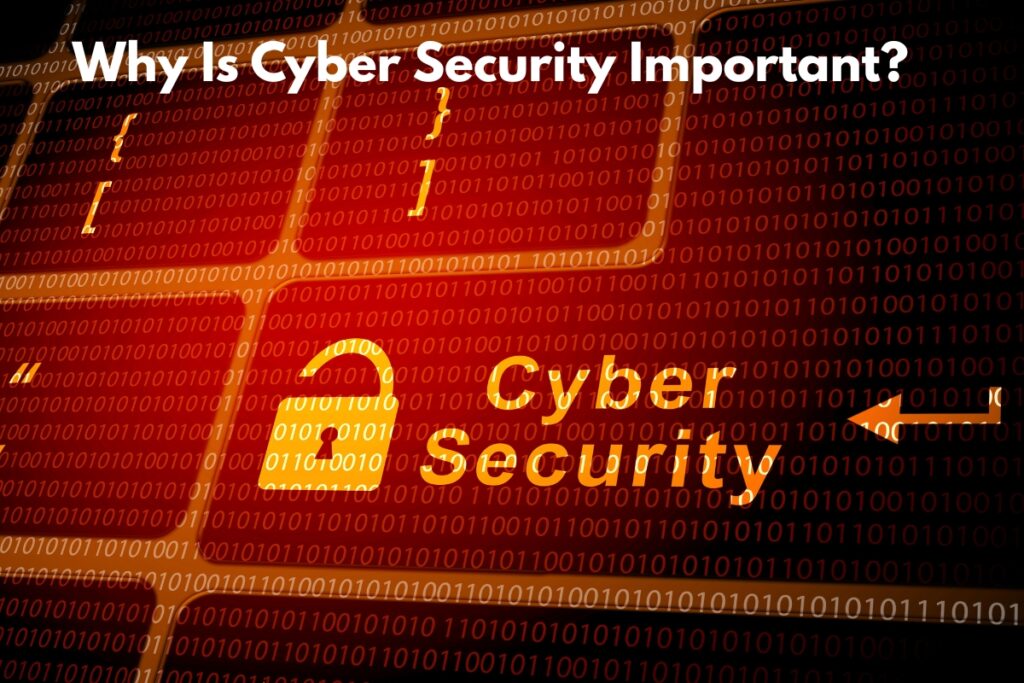Ever left your house without locking the door? That quick mistake leaves everything you value exposed to whoever happens to walk by. In today’s digital world, inadequate cybersecurity is like leaving your business wide open with a sign saying, “valuable data inside – help yourself.”
Yet many businesses still treat cybersecurity as optional or something to implement “eventually.”
Now, let’s explore the 10 reasons why cybersecurity is important for your business survival, reputation, and success in today’s threat-filled digital landscape
Why Is Cyber Security Important?

The need for cybersecurity goes beyond simply having antivirus software or a firewall. Comprehensive security protects your business from cyber attacks, data breaches, ransomware, and countless digital threats that cause financial losses, legal troubles, operational chaos, and reputation damage.
For regulated industries like law firms and healthcare practices, the importance of cybersecurity is magnified. Security is a legal requirement and ethical obligation to protect sensitive client information. Without adequate protection, one breach could potentially close your doors permanently.
10 Critical Reasons Why Cyber Security Is Essential
Here’s why cybersecurity deserves priority attention in your business strategy:
Reason 1: Protect Against Financial Losses from Cyber Attacks
Cyber attacks hit where it hurts most – your bottom line. Ransomware attacks demand payments averaging $84,000 according to Coveware’s Quarterly Ransomware Report, with some reaching millions.
Then there’s the recovery costs, lost revenue during downtime, and increased insurance premiums afterward. For small and mid-sized businesses, these costs can be catastrophic. The IBM Cost of a Data Breach Report shows small business breach costs averaging $108,000 – enough to force many to close permanently.
Consider that ransomware doesn’t just request money – it locks you out of your systems entirely until you pay, holding your entire operation hostage. Proper security prevents these attacks from succeeding in the first place, protecting your financial stability and business continuity.
Reason 2: Safeguard Sensitive Client and Customer Data
Your business holds valuable information that cyber criminals desperately want – customer payment details, personal identification information, healthcare records, legal case files, and proprietary business data.
When breaches expose this information, the consequences extend beyond your business to harm clients and customers. For law firms, exposing attorney-client privileged information violates core ethical obligations. Healthcare practices face severe HIPAA penalties for patient data breaches.
Businesses handling payment information must meet PCI compliance standards. The importance of computer security becomes especially clear when considering the trust clients place in you to protect their most sensitive information. One breach can destroy client relationships built over decades.
Reason 3: Maintain Business Continuity and Prevent Downtime
When cyber attacks hit, everything stops. Email goes down. Files become inaccessible. Applications freeze. The business operations you depend on simply vanish.
| Business Function | Impact of Security Breach |
| Email Communication | Complete loss of external and internal communication |
| Client Records | Inability to access case files, medical records, or customer history |
| Financial Systems | No ability to process payments, access accounts, or manage cash flow |
| Scheduling | Appointment systems are down, creating client service chaos |
| Operations Software | Core business applications are inaccessible, halting productivity |
These disruptions last days or weeks with inadequate security, causing massive productivity and revenue losses. Strong cybersecurity with robust backup systems, security monitoring, and incident response ensures you can maintain operations or recover quickly when attacks occur.
Reason 4: Comply with Legal and Regulatory Requirements

Various industries face strict regulatory requirements mandating specific cybersecurity controls:
- Healthcare: HIPAA requires comprehensive security for patient information with penalties up to $50,000 per violation
- Legal: ABA Ethics Opinion 477 and state bar regulations require reasonable efforts to prevent data breaches
- Financial: SEC regulations, GLBA, and other financial regulations mandate specific security controls
- Payment Processing: PCI DSS standards require specific security measures for handling payment information
Non-compliance results in significant fines, legal liability, and potential loss of professional licenses or certifications. The why cybersecurity question becomes particularly clear when considering these regulatory requirements – it’s not optional, it’s mandatory for continued operation.
Your security approach must address these industry-specific regulations with appropriate technical controls, policies, and documentation.
Reason 5: Preserve Business Reputation and Customer Trust
Security breaches damage your reputation severely. Clients, partners, and markets quickly lose trust in organizations that fail to protect sensitive information. Law firms lose clients after breaches compromise case information. Healthcare practices face patient exodus after HIPAA violations. Professional services firms lose credibility when security incidents occur.
This reputation damage often exceeds direct financial costs, and recovery takes years. Strong cybersecurity preserves your market standing and demonstrates your commitment to protecting stakeholder information.
The 5 importance of cyber security often includes reputation protection as one of its most critical benefits.
Reason 6: Prevent Theft of Intellectual Property and Trade Secrets
Cyber criminals and competitors actively target valuable intellectual property – proprietary processes, client lists, business strategies, and competitive information. Once stolen, these assets create a permanent competitive disadvantage. Professional services firms face a particular risk of IP theft due to the value concentrated in their client relationships and specialized knowledge. Manufacturing and engineering firms risk losing designs and processes representing years of R&D investment.
Proper cybersecurity, including access controls, data encryption, and monitoring, prevents unauthorized access to these crown jewel assets, protecting your competitive position. This highlights why cybersecurity matters for long-term business sustainability.
Reason 7: Protect Against Increasingly Sophisticated Threats
Today’s cyber threats evolve constantly. Attackers use sophisticated techniques, including targeted phishing, social engineering, and advanced malware that evade basic security. Ransomware has evolved into an organized crime industry with groups like Lockbit, BlackCat, and ALPHV operating like businesses, complete with customer service for paying victims.
They specifically target businesses for maximum payment potential. Basic security measures no longer suffice against modern threats. Effective protection requires layered security with advanced threat detection, email security, endpoint protection, and security expertise to interpret and respond to emerging attack patterns.
Reason 8: Enable Secure Remote Work and Cloud Operations
Modern work environments with remote employees and cloud applications create an expanded attack surface requiring enhanced security. Employees accessing systems from various locations need secure connections and protected devices.
Cloud services require different security approaches than traditional systems, with proper configuration, access controls, and monitoring being critical. The cybersecurity needs for distributed workforces continue growing as remote work becomes permanent. Proper cybersecurity enables your business to leverage modern work flexibility securely without compromising protection. It transforms security from a barrier to an enabler of new work models.
Reason 9: Reduce Liability and Insurance Costs
Adequate cybersecurity reduces legal liability from breaches, lowers cyber insurance premiums, and may be required for insurance coverage. Businesses face lawsuits from affected customers after breaches, with proper security demonstrating due diligence that reduces liability.
Cyber insurance increasingly requires specific security controls, with inadequate security resulting in denied coverage or extremely high premiums. The fundamental reason why cybersecurity questions become clear is when insurance carriers refuse to cover businesses with inadequate protection. Investing in cybersecurity is more cost-effective than bearing full risk exposure, making it a financial decision beyond just technical protection.
Reason 10: Support Business Growth and Competitive Advantage
Strong cybersecurity enables business growth by allowing confident adoption of new technologies, winning security-conscious clients, and entering regulated markets requiring security certifications. Businesses with robust security can compete for larger clients and contracts that security-deficient competitors cannot pursue.
Security becomes a competitive differentiator, especially in professional services, where clients evaluate a firm’s security posture. This demonstrates why computer security is important from a business growth perspective – it’s not just defense, but a business enabler supporting expansion and opportunity in security-conscious markets.
Why Professional Services and Regulated Industries Face Greater Security Needs
Law firms, healthcare practices, accounting firms, and professional services face heightened security requirements for several reasons:
- Legal and ethical obligations to protect client confidentiality and privileged information
- Higher-value data makes them attractive targets for cyber criminals
- Regulatory compliance requirements mandating specific security controls
- Professional liability exposure from security failures affecting client matters
General security approaches often fail to address these industry-specific requirements. Specialized expertise in law firm technology, healthcare compliance, and regulated industry requirements provides comprehensive protection aligned with professional obligations.
These specialized needs highlight why generic security solutions often leave professional services firms vulnerable despite significant security investments. Industry-specific security configurations and compliance expertise make the difference between protection and exposure.
Frequently Asked Questions
What happens if a business doesn’t have cybersecurity?
Businesses without proper cybersecurity face data breaches, ransomware attacks, operational disruption, regulatory fines, client lawsuits, reputation damage, and potential business closure. Studies show 60% of small businesses close within six months of a major cyber attack.
How much should businesses spend on cybersecurity?
Typical cybersecurity budgets range from 6-12% of the IT budget for average businesses to 15%+ for regulated industries or high-risk organizations. Professional services firms typically need to allocate 8-10% of IT spending to security measures.
Is cybersecurity necessary for small businesses?
Absolutely. Small businesses face the same threats as large enterprises, but with fewer resources to recover. They’re increasingly targeted precisely because of weaker security. Without basic protection, small businesses risk devastating attacks that larger organizations could survive.
What are the biggest cybersecurity threats to businesses?
The most significant current threats include ransomware attacks, business email compromise leading to financial fraud, phishing targeting credentials, supply chain attacks compromising trusted vendors, and insider threats from employees with system access.
Wrapping Up
The importance of cybersecurity has never been greater. Today’s threats target businesses of all sizes across all industries, with particularly severe consequences for professional services and regulated businesses.
Proper security requires more than basic tools – it needs industry-specific expertise, comprehensive protection layers, and ongoing management. The question isn’t whether you can afford cybersecurity, but whether you can afford to operate without it.
Ready to protect your business from today’s sophisticated cyber threats? Contact Rekall Tech today for a comprehensive security assessment that will identify your vulnerabilities and develop a protection strategy tailored to your specific business needs and compliance requirements.


